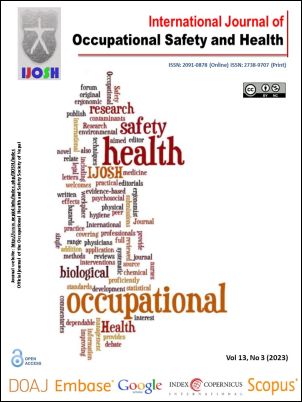Occupational Safety and Health Management in Selected Industrial Sectors in Sudan
DOI:
https://doi.org/10.3126/ijosh.v13i3.46418Keywords:
Health and Safety Management, Safety, Performance, SudanAbstract
Introduction: Since Heinrich's early studies, work has been recognized as a substantial contributor to psychological and physical illness. Fast technological, economic, and social advancements have increased the number of occupational fatalities and illnesses in developing nations. Nonetheless, it is demonstrated that the creation, application, and enforcement of Occupational Safety and Health Management Systems (OSHMS) reduce accidents and enhance employees' well-being. This study aims to understand Sudan's current occupational safety and health situation and identify any challenges or gaps in the current system.
Methods: A mixed methods approach deploying a literature review and secondary data was adopted to answer the research question about the status of occupational health and safety in Sudan.
Results: A comparison of the artisanal and organized gold mining sectors over the years 2018-2020 shows an increase in the number of accidents in the artisanal sector but a sharp decrease in both the number and severity of accidents in the organized sector. The frequency rate declined in the organized sector but fluctuated in the artisanal sector. It was also found that many OSH incidents of different types and levels of severity occurred. In 2020, the Fatal Accident Rate (FAR) was 66.48 in artisanal gold mining, 0.55 in organized gold mining, and 0.01 in oil and gas. However, calculating and comparing other sectors' performance indicators to evaluate OSH's status was not possible for many reasons.
Conclusion: Findings were constrained, possibly due to the limited occupational health and safety data. There is an urgent need to strengthen and improve the governance of occupational safety and health in Sudan. A more comprehensive study needs to be undertaken to assess the status of the OSH in formal and non-formal sectors and investigate the correlation of OSH to workers’ well-being and the Sudanese economy.
Downloads
Downloads
Published
How to Cite
Issue
Section
License
Copyright (c) 2023 Rasha Abdelrahim, Victor Otitolaiye, Dr Faris Omer Omer, Zeena Abdelbasit, Don Anton Robles Balida

This work is licensed under a Creative Commons Attribution-NonCommercial 4.0 International License.
This license enables reusers to distribute, remix, adapt, and build upon the material in any medium or format for noncommercial purposes only, and only so long as attribution is given to the creator.





